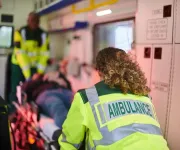(Press-News.org) Birmingham researchers are to set to collaborate on a study that could result in a rapid non-invasive diagnostic test to quickly and accurately identify stroke patients who need time-critical treatment before irreversible brain damage occurs.
Funded by the Stroke Association, the Golden HOur for STroke (GHoST) study will involve the West Midlands Ambulance Service University NHS Foundation Trust, Midlands Air Ambulance Charity, and University Hospitals Birmingham NHS Trust and industry partner Marker Diagnostics. A successful outcome could also revolutionise the way emergency treatment for stroke is managed.
Rapid transfer to hospital and diagnosis is incredibly important if stroke is suspected. Time lost is brain lost, which is why rapid diagnosis and treatment are key to reducing risk of death and severity of disability. Some treatments, such as thrombolysis (clot busting drugs) or mechanical thrombectomy (manual clot removal) are most effective when administered within hours of symptom onset.
Ambulance personnel currently use symptom checklists to identify stroke, with a full assessment usually taking place at a Hyperacute Stroke Unit and followed by transfer to a specialist neuroscience unit for treatment. In the UK, this transfer can add at least an hour to the treatment pathway.
The GHoST study, led by Professor Antonio Belli, Professor of Trauma Neurosurgery at the University of Birmingham’s Institute of Inflammation & Ageing, aims to identify biomarkers (small molecules) in blood, urine, or saliva, that will enable rapid diagnosis so patients can be routed directly to the most appropriate treatment centre.
Professor Belli’s research team has previously identified that the concentration of specific molecules in saliva changes rapidly after a traumatic brain injury. A three-year study in elite rugby established that these biomarkers can be used in next-generation diagnostic tests that can rapidly and reliably detect concussion.
He explained: “Our previous studies detected ultra-early biomarkers and cellular responses that had never been reported in human studies before and resulted in a non-invasive diagnostic test that could change the way concussion is managed. In conjunction with our industry partner Marker Diagnostics, we’re now looking to repeat this success with stroke.”
The GHoST study will use the same methodology as these previous highly successful trials. Trained paramedics will collect saliva, blood and urine samples from patients with suspected stroke within the first hour after the onset of symptoms. Further sampling of blood, saliva and urine will continue in hospital, while patients receive standard clinical care.
The research team will pay particular attention to salivary small non-coding RNAs (sncRNAs). These small molecules, which are abundant in saliva, were probably the most exciting discovery in previous studies, which showed that they could be used in tests to differentiate between concussed and non-concussed patients.
The funding from the Stroke Association will include support from biotech company Marker Diagnostics UK to bring their Birmingham Biohub lab’s sncRNA discovery and commercialisation expertise into the study. Marker has already developed a CE-certified concussion test for adult males following the ground-breaking research from the University of Birmingham, and Marker’s research scientists will use a proprietary sncRNA collection, analysis technology and IP to develop a commercial and adoption pathway for any tests that may arise from this research.
While the GHoST study will be the first to investigate whether there are sncRNAs that are specific to stroke, previous studies have confirmed stroke-specific RNA biomarkers in the blood.
The researchers hope to identify sncRNAs that will accurately identify stroke and distinguish it from stroke-mimicking conditions, such as seizure or migraine, which account for 30-40% of emergency ambulance admissions with suspected stroke.
They will also be investigating whether biomarkers can differentiate between the two main types of stroke (ischaemic and haemorrhagic) which need diametrically different treatment. Ischaemic stroke, caused by a blood clot, accounts for over 80% of strokes and requires either clot-busting drugs or the surgical removal of the blood clot via an artery (thrombectomy), while haemorrhagic strokes, caused by a brain bleed, may require brain surgery.
Dr Richard Francis, Head of Research at the Stroke Association said: “We are excited to be funding this study because it has the potential to reduce death and disability caused by strokes, both in the UK and around the world. Currently, paramedics in the UK rely on the FAST test to assess whether someone is having a stroke. In the absence of brain scanning equipment, FAST is the best diagnostic tool we have. This diagnostic test offers the potential to diagnose stroke in patients more quickly, enabling suitable patients to receive appropriate treatment speedily, therefore, leading to better outcomes.”
It’s essential to contact emergency services immediately if a stroke is suspected. The world-famous stroke acronym, FAST helps people to recognise the signs and symptoms of a stroke: Face, Arms, Speech, and Time (to call an ambulance) – Act FAST.
Dr Francis added: ”FAST is not perfect. At the moment, paramedics can mis-diagnose other conditions, such as seizures, as stroke, and not all stroke patients have FAST symptoms. Having a saliva test would be a massive step forward in pre-hospital diagnosis for stroke and really help people to get the right diagnosis, to get to the right hospital for the right treatment and in the quickest time. The potential success of this trial may also massively benefit countries without ready access to brain scanning equipment.”
The study will run for three years, with results expected in late 2026.
END
Researchers aim for rapid biomarker diagnostic test for stroke, using saliva
2023-07-20
ELSE PRESS RELEASES FROM THIS DATE:
Give more people with learning disabilities the chance to work, Cambridge historian argues
2023-07-20
Employment levels for people with learning disabilities in the UK are 5 to 10 times lower than they were a hundred years ago. And the experiences of workers from the 1910s–50s offer inspiration as well as lessons about safeguarding.
A new study by Cambridge historian Professor Lucy Delap (Murray Edwards College) argues that loud voices in the 20th-century eugenics movement have hidden a much bigger picture of inclusion in British workplaces that puts today’s low rates to shame.
Professor Delap found that in some parts of Britain, up to 70% of people variously labelled ‘defective’, ...
Use of law enforcement strategies to curb underage drinking has decreased over past decade: Study
2023-07-20
By Kimberly Flynn
PISCATAWAY, NJ — Despite the harm that excessive alcohol consumption can cause in a community, use of some alcohol-related enforcement strategies remained low or decreased from 2010 to 2019, according to a new report in the Journal of Studies on Alcohol and Drugs. In particular, researchers found a drop in enforcement of underage drinking laws.
Researchers at the University of Minnesota first surveyed 1,028 county and municipal law enforcement agencies throughout the United States in 2010 about their practices regarding three factors to alcohol harms in communities: underage drinking, impaired ...
The malnutrition paradox: Adolescent obesity in Zimbabwe
2023-07-20
In some African countries that have traditionally faced issues such as undernourishment and hunger, being overweight is perceived as a good sign of health and prosperity. However, in most of these countries, a malnutrition paradox is evident. Obesity, a chronic disease that affects millions of people worldwide, is increasing at an alarming rate in countries like Zimbabwe, where the consumption of processed, energy-dense foods associated with western lifestyles, has been adopted.
An insightful study led by graduate student Ashleigh Pencil, from the Graduate School of Human Life ...
Dreaming in technicolor
2023-07-20
A team of computer scientists and designers based out of the University of Waterloo have developed a tool to help people use colour better in graphic design.
The tool, De-Stijl, uses powerful machine learning technology to suggest intuitive colour palettes for novice designers and inexperienced users. The software combines and improves on the functionalities of existing tools like Figma, Pixlr, and Coolor, allowing users to select important theme colors and quickly visualize how they’ll impact a design.
“You put your graphical ...
NIH renews UC Davis MIND Institute grant to study fragile X-associated syndromes for 24th year
2023-07-20
It’s been 22 years since UC Davis MIND Institute Medical Director Randi Hagerman and her husband, researcher Paul Hagerman, discovered the neurodegenerative condition called FXTAS (fragile X-associated tremor ataxia syndrome). Hagerman, a pediatrician known for her enthusiasm for her work and patients, has been studying FXTAS ever since, seeking to develop treatments for it.
She was recently awarded her 24th consecutive year of funding from the National Institutes of Health for her fragile X-related work, a ...
AI must not worsen health inequalities for ethnic minority populations
2023-07-20
Scientists are urging caution before artificial intelligence (AI) models such as ChatGPT are used in healthcare for ethnic minority populations. Writing in the Journal of the Royal Society of Medicine, epidemiologists at the University of Leicester and University of Cambridge say that existing inequalities for ethnic minorities may become more entrenched due to systemic biases in the data used by healthcare AI tools.
AI models need to be ‘trained’ using data scraped from different sources such as healthcare websites and scientific research. However, evidence shows ...
Monitoring T cells may allow prevention of type 1 diabetes
2023-07-20
LA JOLLA, CA—Scripps Research scientists have shown that analyzing a certain type of immune cell in the blood can help identify people at risk of developing type 1 diabetes, a life-threatening autoimmune disease. The new approach, if validated in further studies, could be used to select suitable patients for treatment that stops the autoimmune process—making type 1 diabetes a preventable condition.
In the study, which appeared in Science Translational Medicine on July 5, 2023, the researchers ...
Important groups of phytoplankton tolerate some strategies to remove CO2 from the ocean
2023-07-20
Humanity has a long track record of making big changes with little forethought. From fossil fuels to AI, plastics to pesticides, we love innovating away our problems, only to find we’ve created different ones. So it can be refreshing to hear about cases where we’ve taken a step back to deliberate before committing to a drastic new idea, like carbon dioxide removal.
With carbon emissions continuing to climb, many scientists, environmentalists and policy-makers have advocated taking action to directly ...
Private equity takeovers of healthcare services linked to patient harm
2023-07-20
Private equity ownership of healthcare services such as nursing homes and hospitals is associated with harmful impacts on costs and quality of care, suggests a review of the latest evidence published by The BMJ today.
No consistently beneficial impacts of private equity ownership were identified, and the researchers say these results confirm the need for more research on private equity ownership in healthcare and possibly increased regulation.
Private equity firms use capital from wealthy individuals and large institutional investors to buy companies, and, after a relatively brief period of ownership, ...
Disrupted access to healthcare during pandemic linked to avoidable hospital admissions
2023-07-20
People who experienced disrupted access to healthcare (including appointments and procedures) during the covid-19 pandemic were more likely to have potentially preventable hospital admissions, finds a study published by The BMJ today.
This is the first study to examine the impact of disruption on health outcomes using individual level longitudinal data, and the researchers say reducing the backlog from covid-19 disruption is vital to tackle the short and long term implications of the pandemic.
The ...


